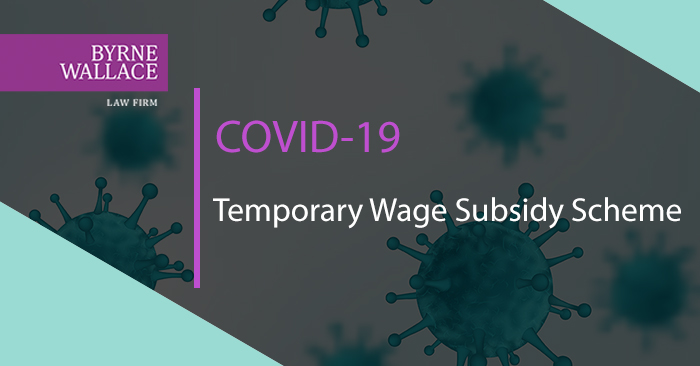COVID-19: Update on the Temporary Wage Subsidy Scheme
Saturday, 18 April 2020
On the 15 April the Irish Government announced a number of welcome changes and updates to the Temporary Covid-19 Wage Subsidy Scheme (“the Scheme”) allowing more employees receive a subsidy of up to €350 per week, with a specific focus on lower paid workers, and workers who have recently taken pay cuts.
The Scheme has been in operation since 26 March 2020 and is currently providing financial support to over 250,000 employees and 43,000 employers affected by the Covid-19 pandemic. A summary of the key changes and updates to the Scheme announced are below. As you will see, the new rules are complex and will require further clarifications from Revenue as to how they will operate in practice.
1. Changes effective from 16 April 2020
- The Scheme has been extended to employees with an annual salary of greater than €76,000 (average net weekly pay of greater than €960 per week) before the pandemic, and who have since taken a pay cut and fallen below €76,000.
- The subsidy will be payable on a tiered basis up to a maximum of €350 a week as follows:
- A pay cut of more than 60% - Subsidy of €350 a week.
- A pay cut of more than 20% up to 60% - Subsidy of €205 a week.
- A pay cut of less than 20% – No subsidy payable.
- The above is also subject to the tapering rules (see 2B below) and ensuring that the net weekly pay (i.e. employer’s contribution and subsidy) does not exceed €960 per week.
2. Changes effective from 4 May 2020
A) Employees with an average net weekly pay of less than or equal to €586 (€38,000 per year):
- Employees with an average net weekly pay of less than €412 per week (equivalent of €24,400 per year):
- The subsidy will be increased from 70% to 85%.
- In addition, the employer can now top-up the subsidy beyond the remaining 15% to allow the employee earn at least €350 a week, even where the original net weekly pay was less than €350.
- Employees with an average net weekly pay of between €412 and €500 per week (equivalent of €24,400-€31,000 per year) will now receive a subsidy of €350 a week.
- There are no changes in respect of employees whose previous average net weekly pay was between €500 and €586 per week (equivalent to €31,000-€38,000 per year), who will continue to receive a subsidy of up to 70%, up to a maximum of €410 per week.
B) Employees with an average net weekly pay of greater than €586 (€38,000 per year):
- The subsidy shall not exceed €350 per week and shall be calculated by reference to the amount of any additional payments made by the employer and its effect on the average net weekly pay. The subsidy amounts are set out by Revenue as follows:
- A subsidy of €350 shall be payable to employees with previous average net weekly pay greater than €586, where the employer pays sufficient gross salary which equates to an amount up to 60% of the employee’s previous net weekly earnings;
- A subsidy of €205 shall be payable to employees with previous average net weekly pay greater than €586, where the employer pays sufficient gross salary which equates to an amount that is more than 60% but not more than 80% of the employee’s previous net weekly earnings; and
- No subsidy shall be payable to employees with previous average net weekly pay greater than €586, where the employer pays sufficient gross salary which equates to an amount that is more than 80% of the employee’s previous net weekly earnings.
Further Guidance
Revenue is constantly updating its published FAQ guidance document on the operation of the Scheme. See link here for the latest version, V6, updated as at 16 April 2020.
Revenue has also confirmed that it will issue detailed guidance shortly to take account of the above changes. Given the complexity of the new rules, this guidance is required and should be closely monitored by employers.
If you have any questions on the Scheme, or would like to discuss any of the other Covid-19 measures, please contact a member of our Tax Team, or Emmet Whelan or Elaine Kelly from our Employment Law Team, or your usual ByrneWallace contact.
Please note that the content of this summary does not amount to professional advice. Legal and tax advice should be sought in respect of specific queries. The COVID-19 situation is evolving rapidly and this update is provided on the basis of information available from State sources as at 16 April 2020.

